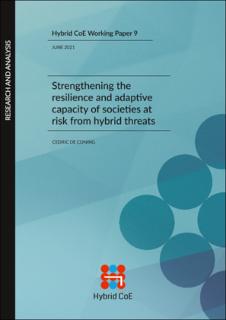| dc.contributor.author | de Coning, Cedric | |
| dc.date.accessioned | 2022-07-27T07:29:52Z | |
| dc.date.available | 2022-07-27T07:29:52Z | |
| dc.date.created | 2021-06-09T08:28:14Z | |
| dc.date.issued | 2021 | |
| dc.identifier.isbn | 978-952-7282-77-9 | |
| dc.identifier.uri | https://hdl.handle.net/11250/3008759 | |
| dc.description.abstract | How would the civilian population of a specific country respond to significant disruptions caused by hybrid threats? This paper explores different response scenarios and considers what can be done to strengthen the resilience and adaptive capacities of a civilian population, and its social institutions, when such threats are likely. One of the main challenges in increasing civilian resilience is the uncertainty and unpredictability of both the threat and how people will respond to it. The paper recommends utilizing an adaptive approach that is designed to cope with the complexity, uncertainty and unpredictability. | en_US |
| dc.description.sponsorship | This paper was produced as a part of the Resilient Civilians in Hybrid Population-centric Warfare project, funded by
the NATO Science for Peace and Security Programme under grant SPS G5442. For more information about the project,
see https://site.uit.no/hybrid/. | en_US |
| dc.language.iso | eng | en_US |
| dc.publisher | Hybrid CoE | en_US |
| dc.relation.ispartof | Hybrid COE Working Paper | |
| dc.relation.ispartofseries | Hybrid COE Working Paper;9 | |
| dc.title | Strengthening the resilience and adaptive capacity of societies at risk from hybrid threats | en_US |
| dc.type | Research report | en_US |
| dc.description.version | publishedVersion | en_US |
| dc.source.pagenumber | 24 | en_US |
| dc.source.issue | 9 | en_US |
| dc.identifier.cristin | 1914706 | |
| cristin.ispublished | true | |
| cristin.fulltext | original | |
